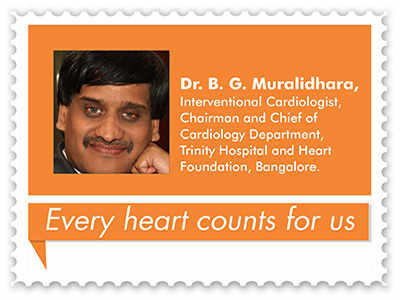- News
- lifestyle
- health-fitness
- every-heart-counts
- Don’t risk your life with your lifestyle!
Trending
This story is from September 3, 2015
Don’t risk your life with your lifestyle!
Indifference to health manifests in several alarming ways. Increasing dependence on technology has resulted in long hours spent peering into desktops, computers, laptops and smartphones which affects the eyes as well as posture.

Indifference to health manifests in several alarming ways. Increasing dependence on technology has resulted in long hours spent peering into desktops, computers, laptops and smartphones which affects the eyes as well as posture.
Most people like to have a good physique but are not prepared to spend time to keep themselves healthy and fit. Anyone with a phone or a computer can find out which items are suitable for eating and which have to be avoided.Similarly information on which exercise regimen to follow and the de-stressing aspects of yoga can also be easily obtained.
Indians do not seem to access or apply this information since our country has the largest number of heart disease patients in the world. Nearly 50 million people in India suffer from heart problems, a number which is expected to double by 2010. According to WHO data, heart disease is poised to be the single greatest “killer” in India by 2015. In terms of percentages, nearly 10% of the Indian population suffers from diverse heart ailments as against 7% in US and Europe and 4% in China.
Data gleaned from preventive healthcare check-ups in 2013 suggests that 35% of Indians with various ailments are the youth and almost 60% of them are diagnosed with life-threatening conditions. In fact, heart attacks kill one out of every 10 Indians and alarmingly 900 Indians less than 30 yrs of age are dying every day of heart attacks.
The key influencing factors for this shocking rise in heart disease incidence include stress, hypertension, obesity and diabetes. Firstly, hypertension and stress, especially from work, account for more than 50% of heart ailments. 100 million people in India have high blood pressure and 2 out of every 3 employees in India are victims of stress. Secondly, more than 40% of urban Indians have high lipid levels (cholesterol and triglycerides) which are the major risk factors for heart disease. Thirdly, nearly 31% of urban Indians are either overweight or obese. Obesity can, in fact, triple the risk of heart disease. Lastly, India also has one of the highest number of diabetic patients in the world, as many as 30 million.
Obtaining appropriate medical advice and taking preventive steps are the tools to fight this rising epidemic. Some pointers for prevention include
• Exercising regularly, for at-least 2.5 hours/week
• Checking and controlling high blood pressure (if present)
• Going for regular preventive health check-ups, to help avoid undiagnosed silent killers
• Monitoring cholesterol levels – to reduce heart disease-related complications
Make every day worth living by following these simple steps!
The article has been contributed by :Dr. B. G. Muralidhara, Interventional Cardiologist, Chairman and Chief of Cardiology Department, Trinity Hospital and Heart Foundation, Bangalore.
Disclaimer: The views and opinions expressed by the Doctors are their independent professional judgment and we do not take any responsibility for the accuracy of their views. This should not be considered as a substitute for Physician's advice. Please consult your treating Physician for more details.
Most people like to have a good physique but are not prepared to spend time to keep themselves healthy and fit. Anyone with a phone or a computer can find out which items are suitable for eating and which have to be avoided.Similarly information on which exercise regimen to follow and the de-stressing aspects of yoga can also be easily obtained.
Indians do not seem to access or apply this information since our country has the largest number of heart disease patients in the world. Nearly 50 million people in India suffer from heart problems, a number which is expected to double by 2010. According to WHO data, heart disease is poised to be the single greatest “killer” in India by 2015. In terms of percentages, nearly 10% of the Indian population suffers from diverse heart ailments as against 7% in US and Europe and 4% in China.
Data gleaned from preventive healthcare check-ups in 2013 suggests that 35% of Indians with various ailments are the youth and almost 60% of them are diagnosed with life-threatening conditions. In fact, heart attacks kill one out of every 10 Indians and alarmingly 900 Indians less than 30 yrs of age are dying every day of heart attacks.
Young executives are maximally affected by this increase in heart disease. Prevalence of heart disease increased from 17.5% to 35% amongst corporate executives in past decade- a two-fold rise. Nearly 1 out of every 8 of these individuals are less than 40 yrs of age. Heart attacks in young executives also occur 10yrs before similar population worldwide, hence prevention needs to start in the early 20s. Moreover, approximately 40% of all heart disease deaths are sudden. Since this continuing tsunami of heart disease is affecting the most productive segment of the society, its socio-economic impact can only be imagined.
The key influencing factors for this shocking rise in heart disease incidence include stress, hypertension, obesity and diabetes. Firstly, hypertension and stress, especially from work, account for more than 50% of heart ailments. 100 million people in India have high blood pressure and 2 out of every 3 employees in India are victims of stress. Secondly, more than 40% of urban Indians have high lipid levels (cholesterol and triglycerides) which are the major risk factors for heart disease. Thirdly, nearly 31% of urban Indians are either overweight or obese. Obesity can, in fact, triple the risk of heart disease. Lastly, India also has one of the highest number of diabetic patients in the world, as many as 30 million.
Obtaining appropriate medical advice and taking preventive steps are the tools to fight this rising epidemic. Some pointers for prevention include
• Exercising regularly, for at-least 2.5 hours/week
• Checking and controlling high blood pressure (if present)
• Going for regular preventive health check-ups, to help avoid undiagnosed silent killers
• Monitoring cholesterol levels – to reduce heart disease-related complications
Make every day worth living by following these simple steps!
The article has been contributed by :Dr. B. G. Muralidhara, Interventional Cardiologist, Chairman and Chief of Cardiology Department, Trinity Hospital and Heart Foundation, Bangalore.
Disclaimer: The views and opinions expressed by the Doctors are their independent professional judgment and we do not take any responsibility for the accuracy of their views. This should not be considered as a substitute for Physician's advice. Please consult your treating Physician for more details.
End of Article
FOLLOW US ON SOCIAL MEDIA









